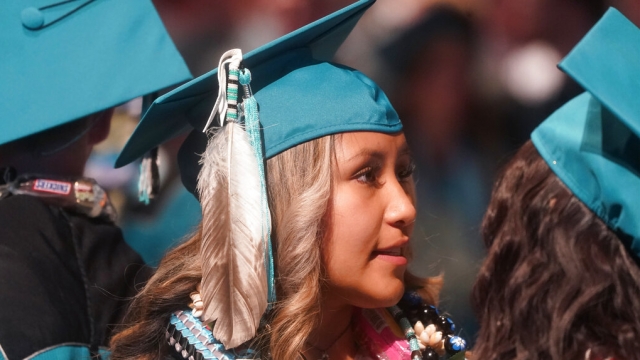This spring, Zuri Jaspré Wilson walked across her high school graduation stage wearing an eagle feather,a celebratory tradition for members of the Cheyenne River Sioux tribe.
"Being able to walk across the stage wearing my eagle feather made me feel proud of myself because I got to honor my family," Jaspré Wilson said. "And it made me feel safe. It will protect me in my next ventures, next steps in life."
Jaspré Wilson is one of many Indigenous seniors from the nation's 574 tribes who wear tribal regalia to their graduation ceremonies. For many Indigenous communities, regalia such as beadwork, eagle feathers, mukluks, and headdresses have spiritual and religious significance in addition to their cultural meaning. But some school districts forbid this tradition, sparking legal battles across the country.
When Jaspré Wilson and her mom, Merissa Wilson, first asked the Pearl Public School District in Mississippi for permission to wear the eagle feather at graduation, the district denied the request even though state law states: "A governmental entity may not prohibit an individual from wearing traditional tribal regalia at public events."
They spent nearly a year petitioning the school board for permission for Jaspré Wilson to wear an eagle feather during commencement.
"We had to end up writing multiple letters to the school district," said Morgan Saunders, an attorney at the Native American Rights Fund. She represented Jaspré Wilson and has helped dozens of Indigenous students hoping to wear regalia at graduation.
SEE MORE: After 187 years, treaty serving Indigenous people will be honored
So far, 12 states have passed laws spelling out the right for Native Americans and Alaska Natives to wear tribal regalia at public events.
On July 1, a new law takes effect in Oklahoma after a politically heated standoff between the Oklahoma legislature and governor. The law permits students at public schools to wear tribal regalia at graduation ceremonies.
Oklahoma Governor Kevin Stitt initially vetoed the bill, arguing that local school districts should be able to set their own dress codes.
"Should this bill become law, the proverbial Pandora's box will be opened for other groups to go over the heads of local superintendents and demand special favor to wear whatever they please at a formal ceremony," said Stitt in a statement to lawmakers.
The state legislature overrode the veto in a near unanimous vote.
The law comes after Lena' Black, a member of the Otoe Missouria tribe, sued her school district in Oklahoma for forcibly removing an eagle feather from her graduation cap last spring.
"Frankly, the conduct is shocking," said Saunders, who is representing Black, "And she ended up suffering a panic attack. It ruined her graduation day."
The lawsuit states that the Broken Arrow School District infringed upon Black's right to "free exercise of religion and freedom of speech" when it prevented her from wearing her eagle feather, even though other students were permitted to wear religious items such as crosses and hijabs.
SEE MORE: This Indigenous artist uses comics to illustrate her Cherokee heritage
The Broken Arrow School District declined to comment due to the ongoing lawsuit. But in court filings, the school district denied prohibiting Black from wearing an eagle feather and argued that she failed to prove how the incident substantially burdened her religion.
"We think it really illustrates why these decisions can't be left up to individual schools," Saunders said.
Courts have found that tribal regalia is legally considered a religious item and is protected by the First Amendment and the 1978 American Indian Religious Freedom Act.
Decades earlier, U.S. policies, such as those in the American Indian Boarding School system, forbade Native communities from practicing their traditions, speaking their language, or wearing traditional regalia.
"It really heightens the emotions," Saunders said. "There is this legacy of stripping away religious and spiritual practices—and there's a huge effort to heal from that, to reclaim pieces that were lost."
Merissa Wilson, Jaspré Wilson's mom, considers modern regalia bans to be a continuation of the assimilation policies of the past.
"They're always trying to make us disappear. And pretend we're not there," Merissa Wilson said. "And I don't ever want to see that happen."
Years before, Merissa Wilson wore an eagle feather at her own graduation. But her mom wasn't able to due to the impacts of U.S. policies. So this year, her mom drove 12 hours to deliver the eagle plume to Jaspré Wilson and watch her granddaughter graduate.
"Seeing my mom afterwards, there were tears in her eyes, and she was just so excited. So happy, so proud," Wilson said.
Saunders said when families and school districts work together to accommodate wearing regalia, the experience is positive.
"We regularly hear from folks that having this opportunity to wear your tribal regalia is more important than the diploma," Saunders said.
Trending stories at Scrippsnews.com




